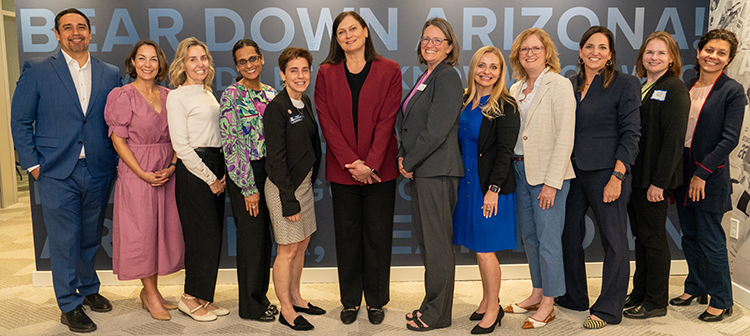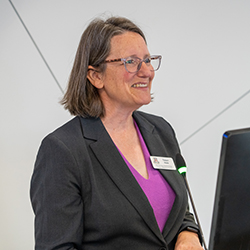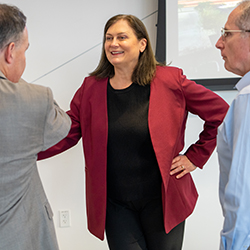Fostering Trust in Health Care Through Collaboration

The Women in Medicine and Science (WIMS) hosted their 8th annual spring dinner at the Bear Down Conference Center in Scottsdale, Arizona.
Organized in collaboration with the University of Arizona College of Medicine – Phoenix’s Office of Health Care Advancement (OHCA), the WIMS spring dinner featured Amy Perry, president and CEO at Banner Health, as the keynote speaker.
Dean Fred E. Wondisford, MD, MS, MBA, provided introductory remarks about the significance of hosting events like this and discussed the importance of the medical school’s partnership with Banner Health.
“It is not possible to have a great academic medical center without a great health system,” Dean Wondisford said. “We’re on this journey together in Phoenix, the fifth most-populous city with a growing market for medical care needed. One that we want to develop together.”

Additionally, Dean Wondisford praised Perry as a valuable and engaged partner when it comes to the relationship between Banner Health and the U of A College of Medicine – Phoenix.
Taben Hale, PhD, vice chair of the Department of Basic Medical Sciences, associate dean of Graduate Studies and director of WIMS, highlighted some of the women who played critical roles in establishing the College of Medicine – Phoenix, such as former Arizona governor Janet Napolitano, Carol Hausler and Jacqueline Chadwick, MD.
“I often highlight the really incredible advancements that our college has made in increasing the percentage of women in senior faculty and leadership positions,” Dr. Hale said. “I am proud and grateful that we have a dean who really recognizes the importance of women in medicine and in leadership.”
While introducing Perry, Dr. Hale shared a few of the CEO’s accomplishments in her more than 30-year health care career, including her entry as the top 100 most influential people in health care. Perry joined Banner Health in November 2021.
“Amy is leading into the growth and development of Banner’s clinically integrated network and health plan coverage,” Dr. Hale said. “Supporting Banner’s One Team culture as the key to success, she relies on a people-first, caring approach and building lifelong relationships.”
During her talk, Perry discussed the current challenging environment for health care and education, emphasizing the impact of federal budget cuts.
“We are in a very unusual time where we may have to determine if our patients meet work or immigration status requirements and qualify for Medicaid,” Perry said. “The state of Arizona receives more than $1 billion in federal subsidies to help cover the cost of Medicaid services, and as the largest provider of Medicaid in the state, Banner needs this funding to continue to care for our growing community.”

Furthermore, Perry spoke about Banner Health’s 10-year strategic plan, which includes fostering trust throughout the entire system. Perry remarked that making health care more accessible to people could lead to building better trust between patients and doctors.
“When we are able to provide health care that’s more accessible, affordable and consumer centric with trying to keep people well, we hope that people will learn to trust us,” Perry said. “It’s incredibly important to us to establish those community bonds.”
Another topic of discussion from Perry’s presentation was the role of artificial intelligence as a tool in medicine. Perry emphasized the value of learning the fundamentals of science, yet also acknowledged the potential AI tools such as Chat GPT could have in medicine.
“This technology is blowing my mind in the way it is exponentially changing every day,” Perry said. “The tools are there. Are we going to look at them on the table or are we going to pick them up and figure out how we are going to deploy them in a safe and effective way?”
About the College
Founded in 2007, the University of Arizona College of Medicine – Phoenix inspires and trains exemplary physicians, scientists and leaders to advance its core missions in education, research, clinical care and service to communities across Arizona. The college’s strength lies in our collaborations and partnerships with clinical affiliates, community organizations and industry sponsors. With our primary affiliate, Banner Health, we are recognized as the premier academic medical center in Phoenix. As an anchor institution of the Phoenix Bioscience Core, the college is home to signature research programs in neurosciences, cardiopulmonary diseases, immunology, informatics and metabolism. These focus areas uniquely position us to drive biomedical research and bolster economic development in the region.
As an urban institution with strong roots in rural and tribal health, the college has graduated more than 1,000 physicians and matriculates 130 students each year. Greater than 60% of matriculating students are from Arizona and many continue training at our GME sponsored residency programs, ultimately pursuing local academic and community-based opportunities. While our traditional four-year program continues to thrive, we will launch our recently approved accelerated three-year medical student curriculum with exclusive focus on primary care. This program is designed to further enhance workforce retention needs across Arizona.
The college has embarked on our strategic plan for 2025 to 2030. Learn more.